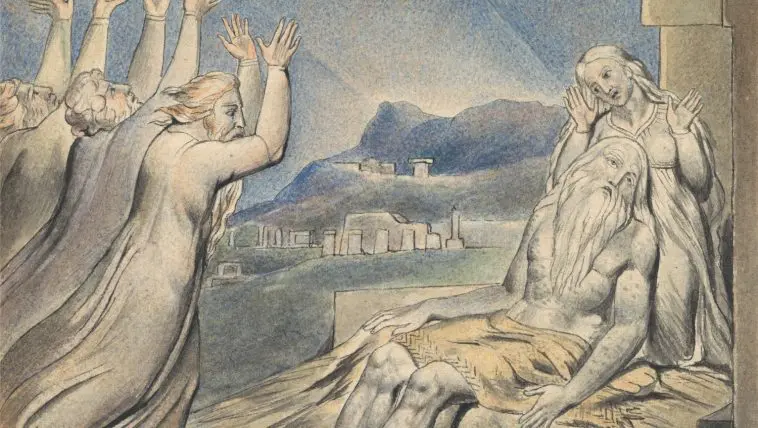[Originally published as The Theology of Job]
Many people have heard of the patience of Job. He was a righteous man who endured great hardship and yet maintained his faith in God. But what is often overlooked is the rich theology contained in the book of Job. Does Job’s theology match that of the modern Christian?
Progressive Theology or Progressive Revelation?
There is a common attitude among liberal scholars that the theology of the Israelites evolved over time as the Bible was being written. They claim that early books of the Bible portray a very different and primitive view of God compared to New Testament books, with ideas like the general resurrection and the Trinity being only late additions.
But do such claims stand up to scrutiny?
God has revealed Himself progressively; that is, as history unfolded, God gradually gave additional information about Himself and His plan of salvation. However, later revelation from God is always consistent with previous revelation. This is because God does not change (Malachi 3:6). Thus, correct theology does not change. Later revelation fills in many of the details but is perfectly consistent with previous revelation.
By analogy, consider watching a movie on an old black-and-white television set. You could certainly understand the plot and enjoy the story. Then consider watching the same movie on a large, high-definition, high-color-depth television. Your experience would be richer, and you might notice details that you had not seen before. But would the plot be different? Of course not. It’s the same movie. Likewise, the New Testament gives us a more vivid and detailed depiction of God and salvation — but a depiction that is completely consistent with Old Testament revelation. We must therefore reject the claim that biblical theology evolved from a more primitive theology.
I experienced an example of such claims in an Old Testament class I took in college. The professor claimed that the earliest Hebrews really had no conception of an afterlife or resurrection. This is supposedly why they were so concerned with producing offspring — since their biological lineage would be their only path to a type of immortality.¹ He claimed that the concept of an afterlife came much later in history. However, a careful reading of the text refutes this claim.
When the Bible records the death of an early patriarch such as Abraham, it often adds that he “was gathered to his people” (Genesis 25:8, 25:17, 35:29, 49:33). Could this simply mean that his physical body was buried near the bodies of his ancestors? No, Abraham was buried in the cave of Machpelah (Genesis 25:9), nowhere near the graves of his ancestors (Genesis 11:28–12:1). Rather, this “gathering” must refer to the afterlife; Abraham’s spirit was brought into the presence of God alongside his righteous ancestors. Abraham lived around 2000 B.C., and so the concept of life after death was already present among God’s people in the earliest writings.
The Earliest Scriptures
Most scholars believe that Job lived around 2000 B.C. There is good internal support for this. Job’s great age is consistent with the typical lifespan of men around that time.² Job sacrificed in a way that was pleasing to God, and yet not in accordance with Levitical law – indicating that Job lived before God gave such instructions to Moses (Leviticus 17:1–10; Job 1:5). This means that the book of Job is very likely the oldest book of the Bible.³ As such, Job gives us a window into the earliest, most “primitive” theology held by believers. How does it compare with New Testament theology?
The Nature of God
Job knew that God is holy (Job 6:10), wise (Job 9:4, 12:13), and all-powerful — the Almighty (Job 6:14). Being all-powerful, God does whatever He pleases (Job 23:13). God is not a man (Job 9:32). God is all-knowing and sees everything (Job 28:24). Job understood that God is the Creator of the constellations (Job 9:8), and the Creator of man (Job 10:8–12, 31:15). He knew that God holds the life of every man and animal in His hand (Job 12:10).
Job knew that God sovereignly controls the environment (Job 12:15) and the nations (Job 12:23). God also sovereignly controls the lives of men (Job 14:5). God is willing to forgive sin (Job 14:16–17). Job knew that God does great things that humans cannot understand (Job 9:10). Job knew that God is invisible (Job 9:11). He knew that none can resist God’s will or question Him (Job 9:11; 12:14). God is a merciful Judge (Job 9:15).
Moreover, as is common in the Old Testament, Job would sometimes use the plural form of the Hebrew word for God, Elohim (literally “gods”), but with a singular verb form (e.g. Job 28:23). This implies that God is one in one sense and more than one in another sense. This of course is consistent with the Trinity: God is one in nature but three in Persons. Therefore, Job, along with other Old Testament authors, had at least a glimpse into the triune nature of God.
The Nature of Man
Job understood that God’s breath imparts life to man (Job 27:3; Genesis 2:7). He knew that Adam sinned and attempted to cover his own transgression (Job 31:33; Genesis 3:6–10). Job apparently knew that humans had inherited a sin nature from Adam since he continually offered burnt offerings on behalf of his sons in case they had sinned (Job 1:5). Burnt offerings remind us that death is the penalty for sin and that we live only by God’s mercy (Hebrews 10:3). Animal sacrifice symbolized and foreshadowed Christ’s substitutionary atonement for our sins (Hebrews 10:1; 2 Corinthians 5:21).
The Incarnation of Christ
Job said, “As for me, I know that my Redeemer lives, And at the last He will take His stand on the earth” (Job 19:25). Yes, Job understood that he had a Redeemer — that his salvation was not by his own merit but by the inherited righteousness of another. Furthermore, Job even knew about the coming incarnation of Christ — that Christ would one day stand upon the earth!
The Resurrection
In the next verse, Job said, “Even after my skin is destroyed, Yet from my flesh I shall see God” (Job 19:26). Job knew that he would die — that his “skin” would be “destroyed.” And yet, he expected to be resurrected so that in his body (his “flesh”) he would see God. Notice that Job was not merely expecting to have an immaterial spirit in God’s presence, but a physical body as well. And from that physical flesh, he would see God. Thus, Job knew that he would be physically, literally resurrected. Job also seemed to recognize that the resurrection would coincide with the coming of the new heavens and earth (Job 14:12; Hebrews 1:10–12), and therefore on the last day as confirmed by Jesus (John 6:40, 44, 54).
Another subtle indication of life after death and the resurrection comes from the way in which God rewarded Job’s faithfulness. Job originally had 7000 sheep, 3000 camels, 500 oxen, and 500 donkeys (Job 1:3). He also had 10 children (Job 1:2). These were all taken away during Job’s trial. But in the end, God rewarded Job with 14,000 sheep, 6,000 camels, 1,000 oxen, and 1,000 donkeys (Job 42:12). That is, all his possessions were exactly doubled. And God gave Job 10 more children (Job 42:13). Why were they not doubled as well? In fact, they were; Job’s original 10 children died but were not lost since they still exist in the presence of God. Job and all 20 of his children will be resurrected on the last day (John 6:44; 1 Corinthians 15:22–26).
The Faith Once for All Delivered
The theology we learn from reading the book of Job is the same theology we read in the rest of the Scriptures. Biblical theology did not evolve; we simply received more details as God gave additional revelation. Job had faith in his Redeemer and knew that one day Christ would stand on the earth. Job was looking forward to the incarnation of his Redeemer which was yet 2000 years in his future. We look back to that event which is 2000 years in our past. However, God’s plan of salvation did not change. Job was righteous not by his own merit but by the imputed righteousness of Christ. Salvation has always been and will always be by God’s grace received through faith in Christ (Ephesians 2:8–9).
Job was certainly not a hyper-preterist; he knew that he would be physically resurrected even after his own death — that in his flesh he would see God (Job 19:26). Thus, the literal, physical resurrection of the dead is found in the earliest revelation from God. How much more should we embrace the literal, general resurrection now that we have the entire Bible? At Christ’s coming, we will be raised just as He was (1 Corinthians 15:22–23).
There are those who try to come up with new theological truths by interpreting the Scriptures in new and unusual ways. But God is not pleased with this (Romans 16:17–18; Galatians 1:8–9). God does not change, and therefore correct theology does not change.
New theology is wrong theology.
Let us therefore avoid the temptation to think that we see in Scripture new truths that were hidden from all Christians of the past. Such an attitude is merely hubris and is unbiblical. Let us avoid novel interpretations, and instead hold to the same faith of our spiritual forefathers. May we hold and defend the faith that has been delivered once and for all to the saints (Jude 1:3).
Footnotes
- It didn’t seem to occur to him that the Israelites desired children because children are a blessing from the Lord and because God had promised that the Messiah would be a descendant of Abraham.
- Job lived an additional 140 years after the events described in his book (Job 42:15). It is possible he was already 70 when the events of his testing took place since all other aspects of his life were doubled as a reward for his faithfulness. This would make his lifespan 210 years, or at least close to this.
- Although Genesis records events that took place prior to Job’s life, Moses did not pen Genesis until approximately 1490–1450 B.C. — five centuries after Job.







